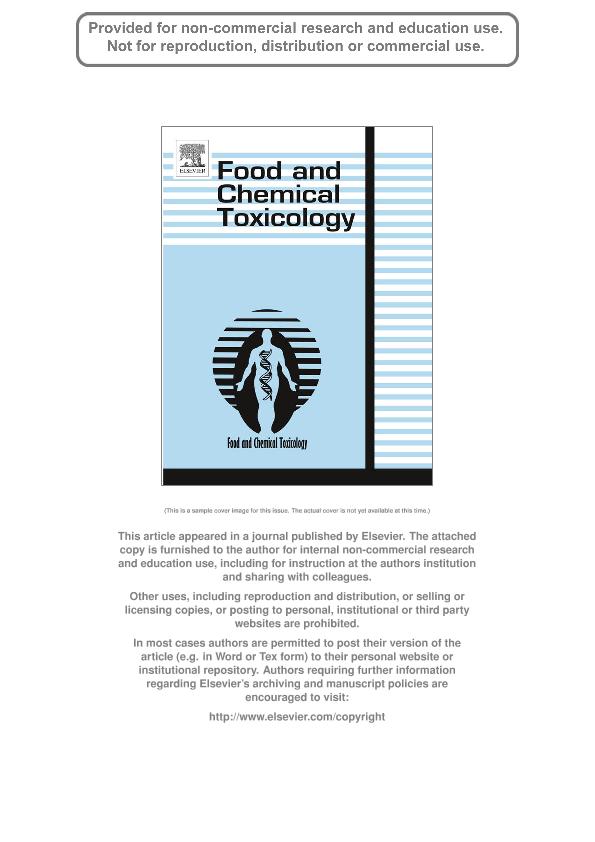Artículo
A soy-based product fermented by Enterococcus faecium and Lactobacillus helveticus inhibits the development of murine breast adenocarcinoma
Lopes Kinouchi, Fernanda; Cardoso Geraldo Maia, Danielle; de Abreu Ribeiro, Lívia Carolina; Campos Polesi Placeres, Marisa; Font, Graciela Maria ; Colombo, Lucas Luis
; Colombo, Lucas Luis ; Rossi, Elizeu Antonio; Zeppone Carlos, Iracilda
; Rossi, Elizeu Antonio; Zeppone Carlos, Iracilda
 ; Colombo, Lucas Luis
; Colombo, Lucas Luis ; Rossi, Elizeu Antonio; Zeppone Carlos, Iracilda
; Rossi, Elizeu Antonio; Zeppone Carlos, Iracilda
Fecha de publicación:
25/11/2012
Editorial:
Pergamon-Elsevier Science Ltd
Revista:
Food And Chemical Toxicology
ISSN:
0278-6915
e-ISSN:
1873-6351
Idioma:
Inglés
Tipo de recurso:
Artículo publicado
Clasificación temática:
Resumen
Purpose: Soy and its fermented products are considered functional foods. The study objective was to assess three functional food - a non-fermented soy product (NFP), fermented soy product (FSP), fermented soy product enriched with isoflavones (FI) - in terms of their ability to reduce the development of adenocarcinoma in mice, as well their ability on modulating immune system. Methods: It was observed tumor volume and to verify correlations with the immune system it was measured levels of the cytokines IL-1β and TNF-α produced by macrophages as well as IFN-γ produced by lymphocytes using ELISA test, and nitric oxide production by macrophages using Griess reagent. Results: All products showed immunological activity, but FSP showed the most effective tumor containment, resulting in smallest tumor volumes. FI animals expressed larger amounts of nitric oxide and IL-1β and exhibited larger tumor sizes than FSP and NFP animals. Conclusions: The results suggested that the ingestion of FSP was most efficient in tumor containment, possibly due to a positive modulation of the immune system by when Enterococcus faecium and Lactobacillus helveticus are added to the soy product.
Palabras clave:
Cancer
,
Cytokine
,
Immune System
,
Isoflavones
,
Soy
Archivos asociados
Licencia
Identificadores
Colecciones
Articulos(CERELA)
Articulos de CENTRO DE REFERENCIA PARA LACTOBACILOS (I)
Articulos de CENTRO DE REFERENCIA PARA LACTOBACILOS (I)
Articulos(OCA HOUSSAY)
Articulos de OFICINA DE COORDINACION ADMINISTRATIVA HOUSSAY
Articulos de OFICINA DE COORDINACION ADMINISTRATIVA HOUSSAY
Citación
Lopes Kinouchi, Fernanda; Cardoso Geraldo Maia, Danielle; de Abreu Ribeiro, Lívia Carolina; Campos Polesi Placeres, Marisa; Font, Graciela Maria; et al.; A soy-based product fermented by Enterococcus faecium and Lactobacillus helveticus inhibits the development of murine breast adenocarcinoma; Pergamon-Elsevier Science Ltd; Food And Chemical Toxicology; 50; 11; 25-11-2012; 4144-4148
Compartir
Altmétricas



